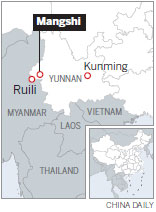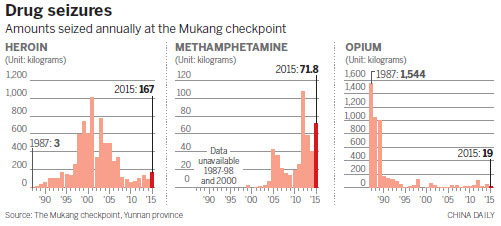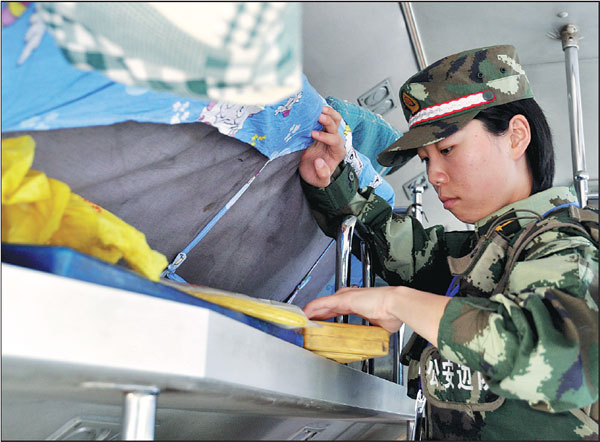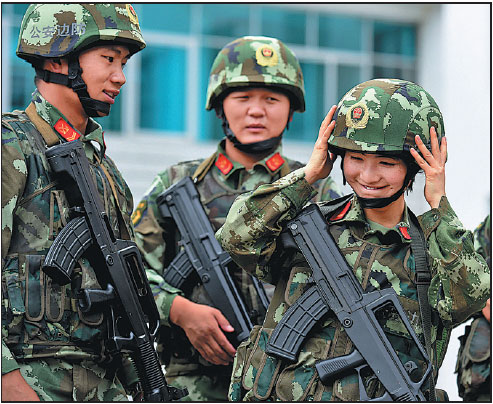Yunnan boosts efforts to stem trafficking
Updated: 2016-11-04 08:14
By Zhang Yi(China Daily)
|
||||||||
Armed police are intensifying the crackdown on the cross-border flow of narcotics. Zhang Yi reports from Mangshi, Yunnan province.
One of the biggest hits at the Chinese box office during the recent National Day holidays was Operation Mekong, an action-thriller by Hong Kong director Dante Lam, which depicts the hunt for a drug lord in the wilds of the Golden Triangle, Asia's largest opium-producing area that straddles Myanmar, Laos and Thailand.
The public may have been gripped by the movie, but according to Meng Liming, it was light relief

compared with the work he and his colleagues undertake at the Mukang border checkpoint in Mangshi city, Yunnan province.
"Our daily work is far more challenging and life-threatening than the anti-drug operations presented in the movie. We are required to wear bullet - and stab-proof vests to ward off attacks. Even wearing a full set of body armor, we are still exposed to unpredictable danger. Drug cases vary one from another and we often face life-and-death situations," said the 40-year-old armed officer, after watching the movie.
Yunnan, in China's far southwest, shares a 4,060 km border with Myanmar to the west and Laos to the south, and is a gateway targeted by drug traffickers.
The dozens of officers who have manned Mukang in the past 15 years have prevented more than 4,500 kilograms of drugs - mainly opium, heroin and methamphetamine - from being sold on China's streets. Last year alone, more than 300 kg of narcotics was seized at the checkpoint, the highest figure in eight years.
Success has come at a heavy cost, though: in the past decade, three officers have died while confronting traffickers and 168 have been wounded.

Experience and tact
Located on National Highway 320, which links the border city of Ruili with Shanghai in the east, the checkpoint is the only major contraband inspection station for the 2,000 vehicles that pass through every day, headed for destinations across China.
"We usually question the drivers and make preliminary examinations of their vehicles. A decision must be made immediately about whether to give them the green light or to ask them to pull over for a thorough examination. That requires a high degree of experience and tact," said Tan Haopeng, the 15th officer to command the checkpoint since it opened in 1978.
"We are aware of more than 400 ways of hiding and smuggling drugs, but some tricks can be very devious and surprising. The officers have to be vigilant with all the vehicles passing through our checkpoint because you can never predict the next new smuggling technique. "
Some are highly ingenious. In 2007, 800 grams of heroin were found inserted into a placenta a female passenger was carrying just hours after she had given birth.
"At first glance I wasn't suspicious about the items in the car. I decided to check the placenta because it seemed to be larger than normal. It turned out that packages of drugs had been inserted into the edges of the placenta," said Su Dan, the officer who made the discovery.
Traffickers are adept at using a range of everyday objects to transport drugs. Consignments of jade, vehicle water tanks and livestock have all been used as hiding places, while children, pregnant women and disabled people are frequently employed to carry consignments.
In September 2000, when police stopped a van carrying live ducks on the road from Mangshi to Baoshan, a city on the border with Myanmar, the officers discovered that a total of 116 capsules, containing 860 grams of heroin, had been inserted into the stomachs of five ducks.
The case was the first of its kind in China, but since then, officers at Mukang have discovered that there are dozens of ways of hiding drugs in the bodies of livestock and humans.
Zheng Zhaorui, a veteran narcotics officer, has spent more than 13 years at Mukang compiling journals about detection techniques. He always carries a notebook so he can record every new method he discovers during his daily inspections.
His 100-page notebooks have played an important role in the fight against drugtrafficking and have been used as examples in Narcotics Control, a textbook used in police academies nationwide.
Community projects
Yunnan's anti-drugs campaign isn't just limited to vehicle inspections. The officers have made great efforts to eradicate production and use in local communities.
Fapa village was once a drug hotspot. Many residents were addicts, while others were dealers, lured to the trade by the prospect of easy money. Although the village has still not fully kicked the habit, an 11-year campaign has greatly reduced drug use.
In 2005, the village was home to 147 users, so 10 armed officers from Mangshi were assigned to help a cleanup operation and improve the residents' lives through community projects. The number of addicts is now just 57.
The officers invited agricultural experts and technicians to the village to teach the residents to cultivate a variety of aromatic tobaccos. After several years of experiments on the farmlands, crop yields are high.
By the end of last year, 497 families had sown an area of 550,000 square meters with tobacco, and per capita income in the village had risen to about 8,000 yuan ($1,180) from 1,100 yuan in 2004.
Meng Liming, who has been stationed in the village, said he had to study hard over a long period before he could communicate with the residents, mostly members of the Dai ethnic group with their own language and unique customs.
Four sentences in Mandarin and the Dai language were written on a blackboard that hangs permanently on the wall of Meng's room.
"Although my colleagues and I began learning the language years ago, we are still learning it so we can better serve the local people. We do our best to help them solve the problems in their lives. I hope they will not be tempted into the drugs business anymore because we have seen how families can be destroyed if a member becomes an addict," he said.
Contact the writer at zhang_yi@chinadaily.com.cn
|
Yuan Xiaorui, a police officer at the Mukang border checkpoint in Mangshi, Yunnan province, checks a long-distance bus.Photo Provided By Mukang Border Checkpoint |
|
Zhang Liu (right), a 20-year-old armed police officer, and her colleagues on duty at the checkpoint in June last year.Lin Yiguang / Xinhua |

(China Daily 11/04/2016 page6)
- Syrian army announces 'humanitarian pause' on Friday
- Park shuffles Cabinet, infuriates opposition
- Court to rule on whether London needs parliament to trigger EU exit
- Seeing country more polarized, American voters fear for future
- France to begin moving migrant minors from Calais
- China-Japan ties growing but unstable: Premier

 China's top 10 post-80s self-made billionaires
China's top 10 post-80s self-made billionaires
 Famous paintings recreated with chocolate
Famous paintings recreated with chocolate
 Looking for a ride?
Looking for a ride?
 Robots draw people to China International Industry Fair
Robots draw people to China International Industry Fair
 German international Miroslav Klose retires
German international Miroslav Klose retires
 Top 10 most influential Japanese cartoons in China
Top 10 most influential Japanese cartoons in China
 Opera performer who takes her shows to villages
Opera performer who takes her shows to villages
 13 most appealing cars in China in 2016
13 most appealing cars in China in 2016
Most Viewed
Editor's Picks

|

|

|

|

|

|
Today's Top News
US election rhetoric unlikely to foreshadow future US-China relations
'Zero Hunger Run' held in Rome
Trump outlines anti-terror plan, proposing extreme vetting for immigrants
Phelps puts spotlight on cupping
US launches airstrikes against IS targets in Libya's Sirte
Ministry slams US-Korean THAAD deployment
Two police officers shot at protest in Dallas
Abe's blame game reveals his policies failing to get results
US Weekly

|

|









